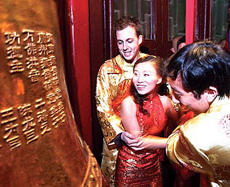| Tools: Save | Print | E-mail | Most Read |
| Ringing in the New Year…for a Fee |
| Adjust font size: |
Temples all over China are gearing up for the Chinese New Year, but not so much to welcome visitors and pilgrims as to begin selling them the right to ring temple bells for good luck, and a fee, according to a January 11 report of International Herald Leader. Dong Ji, manager of a travel agency, is working overtime preparing for the upcoming Chinese New Year, or Spring Festival, celebrations. His company is managing the "rights" to bell ringing at a temple in southern China on the eve of the festival. Bell ringing in temples is a long-standing tradition believed to bring the person who rings it good luck, prosperity, and all the other nice things connected with the new year. According to Dong, the right to administer the very first and last strikes of the bell are particularly sought after. The 66th, 68th, 88th and 99th tolls are also best sellers because these numbers are regarded as auspicious and lucky numbers. Numbers with Dong and his company have been offered a commission as high as 35 percent from the temple for bell strikes sold in advance. For the temple, it is an almost no-cost business. Devotees can strike a temple bell any other time during the year for free. “You have no idea how much we sold the first strike for New Year’s Day, January 1; 8,888 yuan (about US$1,100)! People would surely be prepared to pay more for the first strike for the Chinese New Year Eve," Dong said. Temples across the country started hiring travel agencies as go-betweens when competition for visitors and bell striking services started heating up. The business of selling rights to strike a temple bell on New Year's Day started in 1998 at the Hanshan Temple in Suzhou, Jiangsu Province. In 2002, the temple reportedly sold the first strike for 20,000 yuan (US$2,500). Smelling a nice little income earner, other temples followed suit in late 2002. Jinshan Temple in Zhenjiang, Jiangsu Province, sold their bell striking services in an auction, the first strike starting with a bid of 1,888 (US$234) yuan. It was finally sold for 7,288 yuan (US$903). The Lingshan (Soul Mountain) Great Buddha Scenic Area in Wuxi, Jiangsu Province, sold their strikes ending with the number 8 for 3,003 yuan (US$372) each, and other strikes for 2,002 yuan (US$248) each.
Jianfu Mercy of God Temple in Tianjin sold its first three strikes for a total of 32,888 yuan (US$4,075). In Nanchang City, Jiangxi Province, a local supermarket bought the right to the first strike at Shengjin Pagoda on Chinese New Year’s Eve for 40,888 yuan (US$5,066). The following year, the same supermarket bought the right to the first strike at Tengwang Tower on New Year’s Day for 58,888 yuan (US$7,297). As popular as paying for the right to strike a temple bell might be, Dong stressed that it isn't always possible to sell them all. He said that it's good enough if temples such as Hanshan Temple, for example, manage to sell 70-80 percent of strikes a year. Nevertheless, ringing in the New Year is big business and more and more temples are jumping on the bandwagon. The 733-year-old Bell and Drum Tower in Beijing initially had plans to develop this business. They set the price for the first strike of its famous Yongle Bell at 17,880 yuan (US$2,216). Prices for all 108 range from 1,788 yuan (US$222) to 17,880 yuan (US$2,216), with a total projected income of 200,000 yuan (US$24,784). However, the program was abandoned for relics protection reasons. In Great Mercy Temple in Chengdu, Sichuan Province, candidates were selected based on the size of their donations. It was reported that the "lucky person" donated about 10,000 yuan (US$1,240) to the temple for the privilege of being the first to ring the bell. While some are prepared to fork out large sums of money to strike temple bells, others are not too pleased with what they see as a growing trend. A Buddhist researcher was quoted by the International Herald Leader as saying: “Striking bells on New Year’s Day is to pray for a good life for everybody. However, by selling the striking rights, it only satisfies the wishes of the rich. Temples in China may have financial difficulties, but, as I know, most of them are able to make ends meet through donations. If this carries on, people will lose their belief and faith in Buddhism.” “We are aware that this business of selling bell strikes might have a negative effect on society,” Dong admitted. He added: “Some enterprises pay for rights to strike a bell and give those rights to officials as gifts.” (China.org.cn by Xu Lin January 16, 2006)
|
| Tools: Save | Print | E-mail | Most Read |
 |
| Related Stories |
|
| Product Directory China Search |
Country Search Hot Buys |
